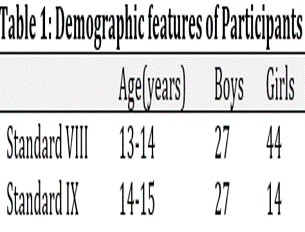Abstract
Adolescent sleep pattern exerts an influence on their physical and mental wellbeing. Several factors such as academic stress, biological and psychosocial factors contribute to adolescent sleep. Reduction in the quantity and quality of sleep can lead to increased daytime sleepiness, interfere with cognitive functioning, memory as well as can lead to behavioural problems.300 adolescent school children in semi-urban Chennai participated by filling a questionnaire which was based on self- reporting of sleep pattern and sleep hygiene. On an average, most adolescents obtained inadequate sleep during the weekdays. The adolescents commonly reported daytime sleepiness, difficulty in falling asleep after going to bed, anxiety, morning headache and feeling tired of waking up in the morning. About half of the participants reported that parents exerted an influence on waking up time. Many adolescents reported the use of social media while going to bed which can reduce sleep duration. Paediatricians can play an important role in promoting healthy sleep practices by providing anticipatory guidance to adolescents and their parents.
Full text article
Authors

This work is licensed under a Creative Commons Attribution-NonCommercial-NoDerivatives 4.0 International License.

